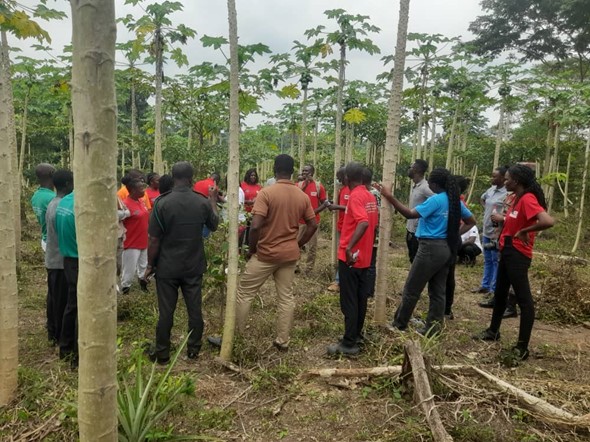In a significant stride towards environmental sustainability, a US$5 million afforestation initiative funded by the European Union has led to the planting of over 600,000 tree seedlings in selected communities in the Ashanti and Bono East Regions over the past four years.
The Landscape and Environmental Agility Across the Nation (LEAN) project which was launched in 2020 has been actively restoring degraded lands across 13 communities in the two regions.
LEAN project aims to bolster governmental efforts in conserving biodiversity, enhancing climate change resilience, and reducing carbon emissions from land use.
This afforestation project particularly focuses on the Savanna, high forest, and transitional zones of Ghana, all while supporting local farmers in improving their livelihoods. Currently, more than 5,000 farmers are benefiting from the project, which is set to end in October 2024.
The LEAN project prioritizes integrated landscape management models across three critical landscapes, emphasizing the need for functional and sustainable governance structures. The initiative also encourages smallholder farmers to adopt more sustainable farming and forest management practices, with added market incentives to diversify rural income opportunities.
During a recent three-day verification visit by a coalition of consortium partners highlighted significant strides made in ongoing projects across the beneficiary communities. The consortia- ECOCare Ghana, Tropenbos Ghana, Rainforest Alliance, and World Vision Ghana, were joined key representatives from notable state agencies such as the Forestry Commission, Ghana National Fire Service, and the Ministry of Food and Agriculture (MoFA).
The tour covered various communities in the Ashanti and Bono East Regions, including Bonsua, Kyebi, and Darso in Offinso North, as well as Asueyi, Mesidan, Konkompe, Drumankuma, and Busunya. The collaborative effort aims to ensure the effectiveness and sustainability of development initiatives within these regions, showcasing the commitment of both local organizations and government bodies to enhance community welfare and environmental conservation.
Mr. Kwame Frimpong Sekyere, Project Manager for Tropenbos Ghana, shed light on the purpose of the visit. “We aimed to draw lessons from other landscape management boards that could serve as models for future landscapes,” he explained. The initiative is currently divided into three landscapes: the high forest managed by Rainforest Alliance, the transitional landscape overseen by Tropenbos Ghana, and the Savanna area managed by World Vision Ghana.
As the project nears its conclusion, sustainability remains a top priority. Mr. Sekyere noted that Landscape Management Boards (LMBS) have been established to ensure continued implementation of the project’s objectives beyond October. These boards will receive support from alternative livelihoods initiatives designed for smallholder farmers, further enhancing the project’s long-term impact.
Beneficiary farmers expressed their gratitude during media interactions, sharing personal stories of how the project has transformed their lives. “I have successfully planted 15 acres of trees, along with interspersed pawpaw plants, on my farm. Thanks to financial support from LEAN, I was able to hire farmhands to help plant and care for over 6,000 trees,” Osei Kwadwo.
He believes the project will play a crucial role in combating climate change and restoring the area’s vegetation cover.










